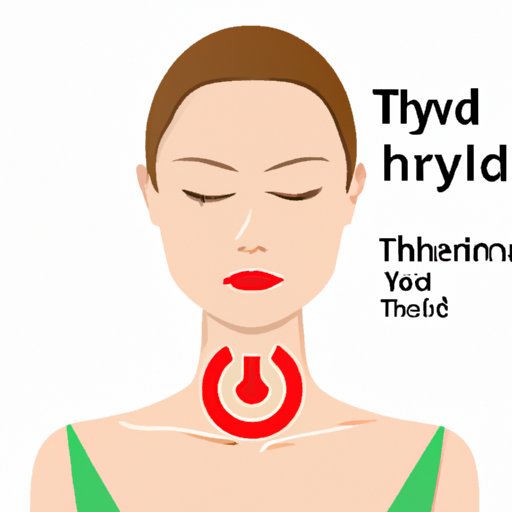
Introduction
Low thyroid, also known as hypothyroidism, is a condition that affects millions of people around the world. While many individuals may experience symptoms of low thyroid, they may go unnoticed or be misdiagnosed. The purpose of this article is to provide an informative guide for those who may be experiencing symptoms of low thyroid or suspects they may have this condition. We will be exploring the most common symptoms of low thyroid, how to get diagnosed, natural remedies for low thyroid, the link between low thyroid and mood, and tips for living with hypothyroidism.
10 Common Symptoms of Low Thyroid: Understanding Hypothyroidism
Hypothyroidism occurs when the thyroid gland is not producing enough thyroid hormones, which play a vital role in regulating metabolism and energy levels. Here are the top 10 symptoms of low thyroid:
- Unexplained fatigue
- Weight gain or difficulty losing weight
- Feeling cold, especially in the extremities
- Hair loss or thinning hair
- Dry skin
- Constipation
- Joint pain or stiffness
- Muscle weakness
- Depression or mood swings
- Irregular menstrual cycles
It is important to note that individuals may experience different combinations and severities of these symptoms. Some people may only experience a few of these symptoms, while others may experience a combination of many.
Diagnosing Low Thyroid: What You Need to Know About Thyroid Tests
If you suspect you have low thyroid, it is important to seek medical attention from a healthcare professional. They may recommend various diagnostic tests to check your thyroid function, including:
- TSH (thyroid-stimulating hormone) blood test
- T3 and T4 (thyroid hormones) blood tests
- Thyroid ultrasound
It is important to consult with your healthcare provider to interpret test results and determine the best course of treatment for your specific needs.
Natural Remedies for Low Thyroid: How to Support Your Thyroid Health
While there are prescription medications available for low thyroid, there are also natural remedies that may help support thyroid health, including:
- Maintaining a healthy, nutrient-rich diet
- Reducing stress levels through relaxation techniques such as meditation, yoga, or tai chi
- Supplementing with vitamins and minerals such as vitamin D, selenium, and zinc
Keep in mind that while natural remedies may be helpful, they should not replace medical treatment and advice from a healthcare professional. Always consult with your healthcare provider before starting any new supplements or making changes to your diet or exercise routine.
Low Thyroid and Mood: Understanding the Connection Between Your Thyroid and Mental Health
Low thyroid can affect not just physical health but also mental and emotional health. Research has shown a link between hypothyroidism and depression, anxiety, and other emotional symptoms. This may be due to the effect that low thyroid hormones can have on brain chemistry.
If you are experiencing emotional symptoms related to low thyroid, it is important to talk to your healthcare provider about treatment options. This may include medication, therapy, or a combination of both.
Living with Hypothyroidism: Tips for Managing Your Condition
If you have been diagnosed with hypothyroidism, there are various lifestyle changes you can make to help manage your condition. This may include:
- Continuing your medication and following your healthcare provider’s instructions
- Maintaining a healthy diet and exercise routine
- Avoiding smoking and limiting alcohol consumption
- Reducing stress through relaxation techniques
- Joining online or in-person support groups
Remember that managing low thyroid is a lifelong process, and it is important to seek help from healthcare professionals and support networks.
Conclusion
Hypothyroidism is a common condition that can cause a range of symptoms, from fatigue and weight gain to joint pain and depression. By understanding the signs and symptoms, and seeking the help of healthcare professionals, individuals with low thyroid can receive a proper diagnosis and appropriate treatment. While there are natural remedies and lifestyle changes that can support thyroid health, it is important to work with your healthcare provider to ensure the best possible care for your specific needs.





